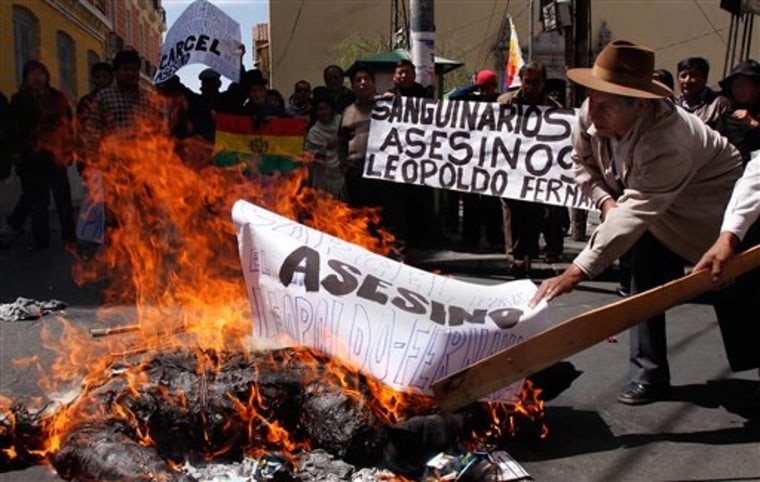South America's presidents converged on Chile for an emergency summit Monday aimed at preventing the collapse of Bolivia, whose leftist president said bloody unrest there amounts to an attempted coup.
Evo Morales said he would explain to his fellow presidents how his political foes in Bolivia's rich eastern lowlands have mounted a "civic coup," inciting "crimes against humanity by groups massacring the poorest of my country."
At least 30 people were killed in political violence last week, prompting Bolivia's first indigenous president to declare martial law in the rebellious state of Pando — where Morales says thugs used machine guns against his supporters — and seek the arrest of its governor.
Gov. Leopoldo Fernandez denied any responsibility for the deaths, calling it an armed clash between rival groups and accusing Morales of "mounting a farce."
Struggle for power
Morales has lost control over most of eastern Bolivia, where protests have blocked highways and closed border crossings and pipeline sabotage has forced a cutoff of nearly half his nation's natural gas exports to Brazil.
Many of the blockades were dismantled as a goodwill gesture on Sunday as both sides sought to establish ground rules for negotiations. And while Bolivia was generally quiet on Monday, more than a thousand Morales supporters marched on the U.S. Embassy in the capital of La Paz.
Morales expelled Washington's ambassador, Philip Goldberg, last week, accusing him of encouraging the unrest in eastern Bolivia.
Before departing on Sunday, Goldberg called the allegation "false and unfounded." Venezuela's president, Hugo Chavez, also expelled his country's U.S. ambassador last week in solidarity with Morales, his closest ally on the continent.
"If he hadn't expelled him we would be tearing down the U.S. Embassy today," protest leader Edgar Patana said as activists burned an American flag and effigies of opposition governors.
In the eastern lowlands, anti-Morales forces continued to occupy government offices they ransacked last week, while backers of the president kept up blockades on the two highways connecting opposition stronghold Santa Cruz with the rest of the country.
In Pando, authorities arrested 10 people allegedly involved in Thursday's reported ambush of Morales supporters, the government news agency ABI reported. State television displayed seized weapons and ammunition including a machine gun.
Attempt at dialogue
In Chile, Foreign Minister Alejandro Foxley said the presidents would try to get a dialogue going after a failed attempt at negotiations last week by diplomats from Argentina, Colombia and Brazil. The Organization of American States secretary general, Jose Miguel Insulza, was also attending, as were presidents for all major South American nations save Peru.
But Bolivia's opposition was not present for the meeting, and it wasn't immediately clear how rhetorical support for Morales in Santiago might help solve the political crisis. Morales' vice president, Alvaro Garcia, met for seven hours Sunday night with Tarija Gov. Mario Cossio, who was representing the opposition governors, to try to establish ground rules for talks.
This is the gravest challenge to Morales's nearly three-year tenure as Bolivia's president. The provinces that hold Bolivia's natural gas riches and its best farmland want more autonomy. They also want Morales to cancel the centerpiece of his tenure — a planned referendum on a new constitution that would give Bolivia's long-suppressed indigenous majority more power, let Morales run for a consecutive second term and transfer fallow terrain to landless peasants.
Arriving in Chile on Monday, Chavez said "a conspiracy directed by the U.S. empire" was at work in Bolivia.
Goldberg denied Sunday that his meetings with opposition governors and Washington's distribution of aid to their states amounted to an attempt to undermine Morales.
Bolivia's president: Unrest an attempted coup
South America's presidents converged on Chile for an emergency summit Monday aimed at preventing the collapse of Bolivia, whose leftist president has lost control of about half the country and said bloody unrest there amounts to an attempted coup.

/ Source: The Associated Press